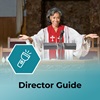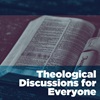Note: Click here for the SmallGroups.com Resource Review of Sacred Roads.
To start off, can you tell us a little bit about your ministry at National Community Church?
I serve by leading the discipleship efforts at NCC. And about 80 percent of that comes through a small-group capacity. We're a multisite church. We meet in movie theaters around the Washington D.C. metro area, and we own and operate the largest coffeehouse in D.C. Our congregation is about 70 percent single and under the age of 35. So it's a very dynamic place and we have a lot going on.
And now you've written a book.
I have.
The title isSacred Roads. Would you be willing to give a brief overview for those who haven't read it yet?
Absolutely. I think the idea for Sacred Roads came about when I had this realization that being a disciple of Jesus Christ, those original 12 guys, must have been anything but boring. When people were following Jesus in the years he was on Earth, he was teaching them in the midst of everyday life. As they were on trips from one location to another, as they were at weddings and at parties, as they were on fishing boats, he taught them about God. He taught them about the ways of God and taught them to be followers of God, and he did that along the path of life. And it was active. It was in your face, and it was always different. Jesus never had the same approach twice.
When you compare that to the way we do discipleship today, something just looks very odd. We have taken discipleship and turned it into six people sitting around a table filling out answers to a workbook, when it really should be more of a workout.
Another thing I was concerned about is something that Bruce Shelley talked about in Church History in Plain Language. He refers to this idea of historical amnesia. I was very concerned about younger, emerging generations coming up without any kind of knowledge or awareness about the rich spiritual history that they're a part of. For many of us, the idea of church history starts with, "My church was founded in 1972." We don't have an understanding of where and how God has been working for the past 2,000 years. And so I saw Sacred Roads as a way for me to help scratch the surface of church history and introduce younger generations to some people that have plowed the ground before us—people we need to honor, and maybe even learn something from.
Having said all that, Sacred Roads basically is an exploration of the historic paths of discipleship, both from the biblical perspective and from an historical perspective. I've noticed five different streams connected with discipleship throughout church history: relational, experiential, personal, intellectual, and incarnational—and we see these both biblically and historically. I wrote the book to help people understand the different paths that can be explored from a discipleship standpoint.
Because disciple works in different ways for different people?
Yes. For some people, going on a mission's trip will be the best discipleship decision they can make. For some people starting a personal quiet time is going to help them grow the most. For others, being in a one-on-one relationship with a mentor or discipler is how they're going to grow the most. And so it's helping people understand all these different arenas and paths, but also helping them discover the one that is the most right for them and the one that they need to lean into the most for spiritual growth.
The five pathways you mentioned are relational, experiential, intellectual, personal, and incarnational. Give us a brief overview of what would characterize each of those paths of discipleship.
In relational discipleship, it's this idea that we grow closer to God as we grow in relationship to one another. So, practically, it involves things like small groups, one-on-one mentoring, one-on-one discipleship. It's this idea that we grow closer to God by being in relationship with each other.
Experiential discipleship happens when we grow closer to Christ because we've had an experience—an encounter with him that's unmistakable. We see that happen a lot in the Scriptures with things like the tabernacle and Jesus taking the disciples up to the Mount of Transfiguration. We can also see experiential discipleship in the medieval church with the cathedrals and the soaring music—believers were immersed into a medieval multisensory experience. Examples of experiential discipleship today would include retreats, or maybe a worship service that was very meaningful. It might be participating in some ancient traditions and disciplines like Stations of the Cross or observing a season of Lent. Experiential discipleship is having an encounter with Christ that leaves us forever changed. It's not just a mountaintop experience; it leaves us changed.
Intellectual discipleship is the idea that we grow closer to Christ as we learn something new that changes our mind—that gives us the mind of Christ and that causes us to love God more. We see this a lot in Reformation history as people crack open the Word of God and struggle with the difficult doctrines of our faith. Those struggles don't have to become dividing points; they can be catalysts to help us grow closer to Christ, to drive us deeper into his Word, and ultimately to love him more.
Personal discipleship is growing closer to Christ by practicing personal spiritual disciplines in our lives—having a personal quiet time, having a rule of life, learning from the monastic traditions, having those times where we get away by ourselves and are seeking after God. It's ordering our lives in such a way that through discipline, through practicing, through implementing spiritual practices in our lives that we're growing closer to Christ.
And then finally, incarnational discipleship is growing closer to Christ by literally becoming his hands and feet to the world around us. It's serving those around us. It's going on mission and being in service to our community and practicing hospitality. It's the very physical, raw dimension of discipleship where we become like Christ because we're actually doing the kinds of things that he would do if he were still with us today.
Am I correct that you've connected these different pathways with different periods of time in Christian history?
Absolutely. The first 100 years of the church were very relational. There were no Bibles. There were no church buildings. The New Testament hadn't been canonized yet, so the people were passing letters around and meeting in the catacombs, meeting in the temple, meeting from house to house. It was very relational.
And then when the church became institutionalized under Constantine, things switched to discipleship that was primarily experiential. All of a sudden church buildings were being built. The architecture was very strategically determined to point people towards God. The art in a church was designed to teach people lessons about theology. The music was helping people connect in a worshipful way with God.
Then the Reformation happened in 1517, and we see a shift happening in church history where people wanted to read the Bible for themselves. They wanted to study. We see the rise of seminaries and learning, and people wanted to discover the truth for themselves. We see the rise of systematic theology and debates amongst theologians. So that was the rise of this intellectual form of discipleship.
As we hit the 19th and 20th centuries, I see two paths veering off from there. One is this idea of personal discipleship, where we begin encouraging people to have a personal time with God. We see quiet times becoming a very central focus of churches and how they help people practice spiritual growth. Publishers began putting out books and resources that helped them do that. This shift sprang, I think, from some of what was happening with pietism and the Puritan movement, where there was not necessarily rejection of the intellectualism of the Reformation, but a recognition that what is happening intellectually has to be tied with our hearts devotionally, and so personal discipleship has stemmed from that.
Incarnational discipleship is what we see with the sudden rise of the missionary movement, and even justice and compassion oriented discipleship where the best way to grow closer to Christ is to actually do what he did. It's taking discipleship out of the classroom or out of the home and throwing it out into everyday life.
What about the 21st century? Are we leaning into a more specific pathway today, or are we all just jumbled up?
Well, there is a chapter in the book that's called "Discipleship Next," and it looks at technology and how that can both be a help and a hindrance to discipleship. What do we do with online sources of training or online discipleship? What do we do with social networking?
And what I'm finding is a lot of church leaders, especially in the emerging generations, dipping into all of these five historical strains and almost building their own version of discipleship. So it's not odd to find a kid who comes from a Protestant evangelical world wanting to go on pilgrimage. It's not odd for me to sit across a table in a coffee shop with an Anglican priest who wants to know more about how to use social media and how to use video and how to use contemporary worship in his setting. And so I think we're seeing a lot of synthesis of what happened behind us, but also finding new ways to incorporate discipleship and understand it through technology, through online media, through social networking, and through all of those social/philosophical changes that we're seeing in the 21st century.
Earlier you mentioned that there is some dissonance between what Jesus did with discipleship and what we do today with workbooks.
Yes.
I would consider Sacred Roads to be a workbook—at least, it's printed material that people will gather around and study. So how do you hope people will use Sacred Roads? And by extension, how can people today use any study guide in a way that's more like what Jesus was doing?
It's really funny because I wrote a type workbook, but then on page 10 it turns around and bashes the whole idea of people coming around a workbook and then calling that discipleship. For me, everything boils down to this question: Are you putting it into practice? The printed material is not an end in and of itself; it's a tool to get us moving toward something else. To me, sitting around in a small group and filling out answers about prayer is fine, but maybe we ought to just pray—that's where I feel some tension.
And so I think the way Sacred Roads is designed to be used best would be in the context of a small group—which is a relational form of discipleship—but used as a tool for people who then covenant and commit together to put some of the stuff into practice. To explore it. If you just come and sit and talk through the workbook for an hour and a half once a week, that's not really what discipleship is about. It's about dipping into each of these areas and experimenting with them. It's about taking a week to experiment with personal discipleship or with intellectual discipleship—actually as a group getting out and experiencing it together. It's about realizing that some people in the group are really going to resonate with one form and others are not going to get it at all, and that with each of the five pathways, different people are going to lean into different ones. I know that some of the best discipleship moments I've had are with people that really lean heavily into a personal mode of discipleship, which I don't as much. But learning from them has been an incredibly rich experience.
So if you're going to do Sacred Roads, know that it can't just be a once a week thing where you come together and talk about the questions. You need to find ways to physically, actively, and strategically put it into practice. And then at the end of the 6 weeks or the 8 weeks or the 12 weeks, hopefully you have found a way to develop your own rule of life or set some goals for spiritual growth that will carry you forward for the next year or two years or even beyond that.
That makes sense, and that would certainly apply to a lot of Bible studies.
Yeah. It absolutely should. There's nothing wrong with workbooks, obviously. But they all should be helping us move towards a different way of living. Where I get concerned is where we just leave it in the hour-and-a-half discussion once a week.
Is there anything else you think would be important to communicate to readers of Smallgroups.com who are interested in Sacred Roads, or are interested in these different pathways of discipleship?
I think Sacred Roads is going to be most appealing to emerging generations that maybe are tired of doing church the same old way—people who are excited about the idea of following Jesus, but they're not excited necessarily about following a bunch of rules. And so I think Sacred Roads can open up our understanding of what discipleship can look like and what following Christ can look like to some ways that maybe we've not thought about before.
I'm actually doing also a blog series on Sacred Roads where I'll be introducing people to some of the voices from history that have exemplified or pioneered some of these different areas. And so that's another resource that's free that people can check out if they're interested in learning more.
—Heather Zempel is the Discipleship Pastor at National Community Church in Washington, D.C. She is the author of Sacred Roads and blogs regularly at Wineskins for Discipleship.
Copyright 2010 by the author and Christianity Today









